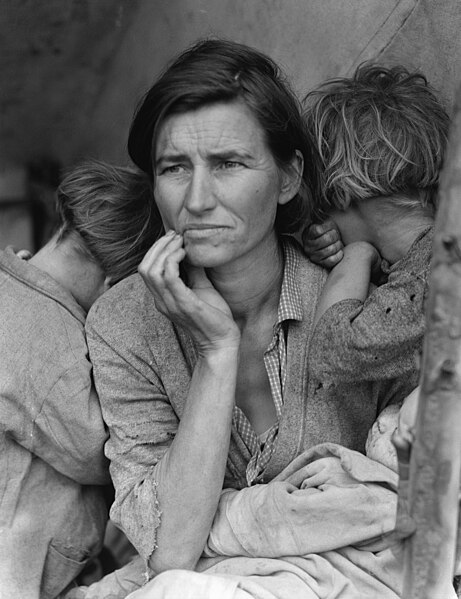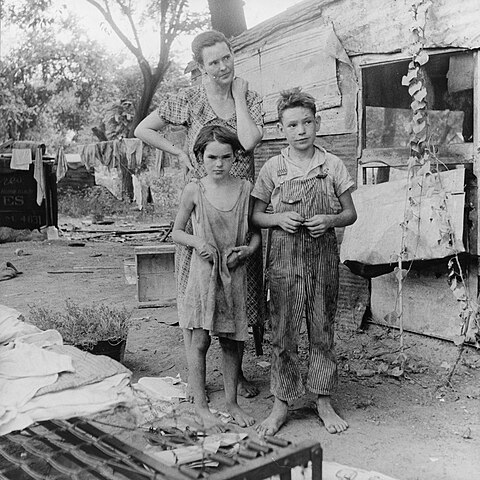
The Grapes of Wrath is a novel written by the American author John Steinbeck, published in 1939. Steinbeck was given the Nobel Prize in Literature in 1962, in part for his achievement in writing this novel. It was adapted into a celebrated movie in 1940, directed by John Ford. The title of the book is a phrase from the Bible.
Wrath means extreme anger. The God of the Bible expresses anger over the bad things in the world. The idea is that people who are bad will someday be punished for their offenses.
The words grapes of wrath are especially remembered in America because they appear in a song that became famous during the American Civil War. In 1861, the American poet Julia Ward Howe was opposed to slavery, which she considered an evil. Drawing on a reference to the Bible, she wrote a poem, The Battle Hymn of the Republic, suggesting the there would be a great battle over this injustice:
======================================
Mine eyes have seen the glory of the coming of the Lord;
He is trampling out the vintage where the grapes of wrath are stored;
He hath loosed the fateful lightning of His terrible swift sword;
His truth is marching on.
===============================
Although this is old style English with unusual vocabulary, it basically means that there is a god who is angry about injustice and plans to do something about it. Howe set her poem to the melody of a folk song, and it soon inspired many people who were fighting against slavery. Steinbeck’s characters were working against a kind of economic slavery. His book is set in America during the time of the Great Depression.
This economic downturn lasted from 1929 to 1939. In many countries, America is seen as a place of rich people, but then as now, there have also been millions of very poor people as well. In Steinbeck’s novel, a family named Joad were farmers in Oklahoma. They were tenant farmers, who did not own the land they were allowed to farm.
Because of climate change and a great drought, they were forced to move from Oklahoma to California to find work. Then as now, some people were starving in America. For students and ajarns interested in the subject, the Thammasat University Libraries have a selection of books on poverty in America.
Steinbeck discussed some public policies of the time that were considered unfair. For example, although many people did not have enough to eat, food was still destroyed in order to keep prices high.

Thailand and Poverty
Happily, there are ways to improve conditions of extreme poverty in a nation. According to the website of The World Bank:
Thailand is one of the great development success stories. Due to smart economic policies it has become an upper middle income economy and is making progress towards meeting the Sustainable Development Goals.
In April, the World Bank confirmed that Thailand became an upper-middle income economy in 2011, adding:
Over the last four decades, Thailand has made remarkable progress in social and economic development, moving from a low-income country to an upper-income country in less than a generation. As such, Thailand has been one of the widely cited development success stories, with sustained strong growth and impressive poverty reduction, particularly in the 1980s.
From 1960 to 1996, Thailand’s economy grew at an average annual rate of 7.5 percent, reduced to 5 percent after the Asia-wide crisis from 1999 to 2005. Millions of jobs were created, helping people to escape poverty. As a result, more Thai children are now benefiting from education, since most do not need to stop going to school to earn money to feed their families. Over the last 30 years in Thailand, poverty has reduced from 67% in 1986 to 7.2% in 2015. As all Thais know, there is still poverty, mostly in rural areas of the Kingdom. In 2014, over 80 percent of Thailand’s 7.1 million poor people lived in rural areas. One World Bank project directly linked to economic results is to protect the environment:
A climate change project is promoting cleaner production of air conditions and foam products to help phase out harmful ozone-depleting global warming gases. Thailand has also joined the World Bank Group’s Partnership for Market Readiness, a global climate change alliance of more than 30 nations, to reduce greenhouse gas emissions and energy consumption. Recently, Thailand received a grant of $3.6 million (USD) from the World Bank’s Forest Carbon Partnership Facility to manage and protect the forests.

Part of the tragedy that happened to Steinbeck’s characters in The Grapes of Wrath was that when climate change occurred in the form of a drought, there were no plans in place to help people.
Last year The World Bank announced that by joining the World Bank Group’s Partnership for Market Readiness, a global alliance of more than 30 nations to reduce greenhouse gas emissions and energy consumption in developing countries, Thailand was working
to scale up climate change mitigation efforts.
The latest statistics from the Asian Development Bank show that in Thailand, 10.5% of the population lives below the national poverty line. This is about the level of conditions in Indonesia, and not as good as in Vietnam and Malaysia. However the percentage of people living below the poverty line in Thailand is less considerable than in Cambodia, Lao People’s Democratic Republic, Myanmar, and Philippines. The website of the United Nations Development Programme (UNDP) explains that part of the improvement of standard of living for Thais has been due to the stability of the Kingdom’s Constitutional Monarchy:
Thailand’s constitutional monarchy, in place since 1932, and other institutions, have provided an underlying stability that has allowed for rapid development until the 1990s.
The UNDP identifies some continuing challenges, particularly gender equality:
Inequality is also a challenge. Vulnerable groups, such as migrants, informal workers, and displaced persons, are not equally benefiting from Thailand’s economic successes… Climate change remains a threat. Thailand emitted 4.4 tonnes of carbon dioxide into the atmosphere per person per year in 2010. The effects of climate change have elevated risk of natural and man-made disasters, droughts, extreme weather patterns and sea level rise, threatening economic development and community livelihoods. At the same time, there are concerns about environmental sustainability.
Among ongoing Millennium Development Goals are to eliminate extreme hunger and poverty; establish universal primary education; promote gender equality and empower women; reduce child mortality; improve the health of mothers; fight HIV/AIDS, malaria and other diseases; ensure environmental sustainability; and reach a global partnership for development. Naturally these are long-term aims that require much planning and international cooperation. Thailand’s national human development process is ongoing.

(All images courtesy of Wikimedia Commons)
